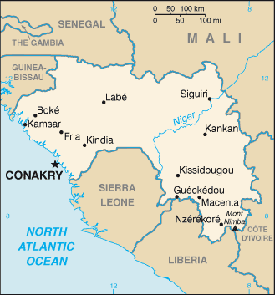Guinea gov't fires on workers' general strike
By
G. Dunkel
Published Jan 26, 2007 9:03 PM
Workers in Guinea (Conakry) went out on an unlimited general strike Jan. 10
with strong popular support. The workers are demanding that Lansana Conté,
the president who came to power in 1984 through a coup and who suffers from
diabetes, step down because of “ill health.” They also protest
Conté’s ordering the release of two prominent business executives
who are his friends from jail on corruption charges. The unions want the
endemic corruption and thievery of public funds ended, and the prices of
gasoline and basic necessities reduced.
On Jan. 22, troops fired on the strikers and protesters, killing at least 17
people, according to Reuters.
The two people released after 10 days in jail are Mamadou Sylla, the head of
the Organization of Employers, and Fodé Soumah, vice-governor of the
Central Bank from 1994 to 2004, who were charged with stealing 2 million
euros.
Moktar Ba, a reporter for Radio France International in Conakry, the capital of
Guinea, says the real reason for the general strike is the people’s
growing misery. Most people survive on less than $1 a day—even though
Guinea is the world’s second biggest producer of bauxite, the source of
aluminum, and possesses about one-third of the world’s reserves. It also
is a major producer of gold.
The union movement called two widely followed general strikes last year.
The strike closed Sangaredi, the main site for the extraction of bauxite, which
belongs to the Bauxite Company of Guinea (CBG), a joint venture of a Guinean
state-held company with Alcoa, the U.S. transnational and Alcan, the other
world producer of aluminum, which is based in Canada. The two transnational
corporations hold a 51-percent stake in the CBG.
To begin the strike, unionists just went into the mine and asked the workers
there to shut it down. “The union members came and called on everyone in
the offices to leave ... they said if there’s no agreement between the
state and the unions, the whole chain of production will be halted from
Thursday [Jan. 11] onwards,” a senior CBG official told Reuters.
The port through which the bauxite is exported is also closed, according to the
Mining Journal.
Reuters reported that the price of bauxite on the world’s commodity
exchanges jumped from $220 a ton to $250 to $280 a ton, but the feeling of the
markets was that the supply disruption wouldn’t last long.
According to Habibou Bangré, writing in the online newspaper Afric,
President Conté met with Dr. Ibrahima Fofana, the secretary general of the
Guinean Workers Union (UTG), Rabiatou Serah Diallo, secreatry general of the
National Confederation of Guinean Workers (CNTG), and some other community and
labor leaders during the first week of the strike.
“Instead of negotiating, Conté threatened to do them harm, to beat
them, to kill them,” a member of the Nation Council of Civil Society who
was present told Bangré. According to Fofana’s report of the
meeting, the president said: “I am considering having all of you killed.
I have already killed, I am still capable of killing but I do not know when I
am going to do it.”
Over the 10 days of the strike, the cops and the army have broken up various
marches and demonstrations throughout the country with tear gas, rubber bullets
and live ammunition. Around 20 people have been killed, and according to the
RFI, hundreds have been arrested. Still the head cops have been saying that
they have been acting to protect the demonstrators against
counter-protesters.
A blog from Guinea (http://www.observateur-guinee.com/) has a number of appeals
to the army and the cops not to fire on the people and is calling for the
people to fraternize with the soldiers and explain the reasons for the
protests.
The latest communiqué (no. 33) from the joint committee coordinating the
general strike makes it clear that the labor movement intends as of Jan. 22 to
continue the struggle: “We are not going to back down after so many
deaths. We are not going to hesitate when the international community is
mobilizing to aid us. We must carry on to the end.
“We congratulate and encourage the Guinean people, particularly the
youth, and bow sincerely to the memory of the martyrs fallen under the bullets
of the forces of order, and reassure them that their sacrifice will not be in
vain. There will be a massive march Monday, Jan. 22, in Conakry beginning at 9
a.m.”
The communiqué goes on to call on the regional committees and union
confederations to hold marches at the same time.
It ends with: “Stay strong! The strike will continue until total victory.
Let us mobilize together to save our country from its peril.”
Articles copyright 1995-2012 Workers World.
Verbatim copying and distribution of this entire article is permitted in any medium without royalty provided this notice is preserved.
Workers World, 55 W. 17 St., NY, NY 10011
Email:
[email protected]
Subscribe
[email protected]
Support independent news
DONATE


